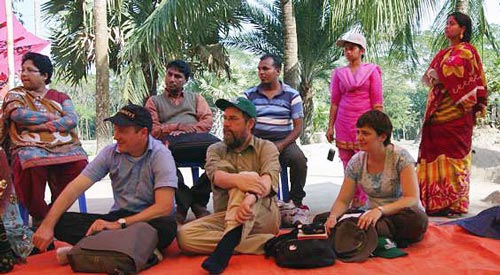 As farmers in southern Bangladesh –the country’s most impoverished region– face increasing costs of agricultural labor and negative effects of climate change, CIMMYT-Bangladesh partners with farmers and agricultural service providers throughout the region to turn these challenges into opportunities. This work to improve farmers’ livelihoods by developing affordable irrigation and efficient machinery has drawn attention from donors and distinguished guests, many of whom recently visited some of the region’s areas to see the changes brought by CIMMYT in action.
As farmers in southern Bangladesh –the country’s most impoverished region– face increasing costs of agricultural labor and negative effects of climate change, CIMMYT-Bangladesh partners with farmers and agricultural service providers throughout the region to turn these challenges into opportunities. This work to improve farmers’ livelihoods by developing affordable irrigation and efficient machinery has drawn attention from donors and distinguished guests, many of whom recently visited some of the region’s areas to see the changes brought by CIMMYT in action.
On 06 February 2013, Saharah Moon Chapotin (team leader for agricultural research at USAID) and Tony Cavalieri (Bill & Melinda Gates Foundation, BMGF) visited activities conducted under the Cereal Systems Initiative for South Asia in Bangladesh (CSISA-BD) funded by USAID’s Feed the Future initiative with support from the BMGF. CSISA-BD is a collaborative project of CIMMYT, the International Rice Research Institute (IRRI), and WorldFish aiming to sustainably increase productivity of cereal-based farming systems by developing innovative agricultural technologies –including small-scale agricultural machinery and conservation agriculture– and market linkages to raise household incomes. Accompanied by cropping system agronomists Timothy J. Krupnik and Samina Yasmin (CIMMYT-CSISA), Global Wheat Program associate director and wheat pathologist Etienne Duveillier (CIMMYT), regional agronomist Andrew McDonald (CIMMYT), and director of IRRI in Bangladesh Timothy Russell, the team visited the Patuakhali region of southern Bangladesh, where preliminary results of rainfed maize field trials managed by farmers showed both yield increase (1.5 t/ha) over conventional management practices and reduced production costs. Farmers have seized this opportunity and are increasingly growing maize to sell to tourists at premium prices in the nearby beach district. The guests also visited IRRI rice screening trials, WorldFish activities to introduce micronutrient dense fish species, and women’s producer groups involved in maize cultivation.
The following week, the US Ambassador to Bangladesh Dan Mozena and USAID Mission Director in Bangladesh Richard Green visited CSISA-BD activities in the Shatkira district. After a welcome from CIMMYT agronomists Krupnik and Md. Shahjahan, and IRRI and WorldFish delegates, they learned about CIMMYT’s efforts to test, refine, and extend labor-saving and cost-reducing conservation agriculture machinery to farmers through agricultural service networks, and through the study and promotion of two-wheel tractors to power fuel-efficient, surface water irrigation pumps (axial flow pumps, AFPs) used particularly for bed-planted maize fields. Ambassador Mozena commented, “I have seen a CIMMYT project funded by USAID and working with the Government of Bangladesh to help increase food security. Wonderful things are happening right here. I saw a beautiful maize field grown with new technology. If you don’t have this machinery and you are using only day labor, it is very hard to cultivate enough land. This machinery really works.”
Two days later, a European Union delegation visited the EU-funded Agriculture, Nutrition and Extension Project (ANEP) in Barisal, Bangladesh, one of the poorest regions subjected to tidal flooding and low annual crop productivity. ANEP is a partnership between CIMMYT, International Development Exchange (iDE), Save the Children, WorldFish, Community Development Center (CODEC), CEAPRED, and BES-Nepal. The EU delegation included Philippe Jacques (head of EU cooperation in Bangladesh), João Anselmo (attaché to the EU delegation), Marion Michaud (ANEP-EU task force manager based in Nepal), and Roselyn Mullo (ECHO regional nutrition coordinator). ANEP focuses on increasing cropping intensity in Barisal to enable farmers to grow two economically viable crops per year. Krupnik and Yusuf Ali demonstrated how small-scale machinery used for strip tillage and bed planting can help farmers to plant dry season crops such as wheat, maize, and legumes, while reducing costs and saving irrigation water. “Within ANEP, CIMMYT partners with iDE to develop seasonal crop production business plans tailored to specific villages and farmers’ organizations. These production plans help farmers to make better decisions on how to assure timely harvesting, aggregation of grain, and delivery of maize to the market to obtain premium prices,” added Krupnik.
 Nutrition, health and food security
Nutrition, health and food security 
